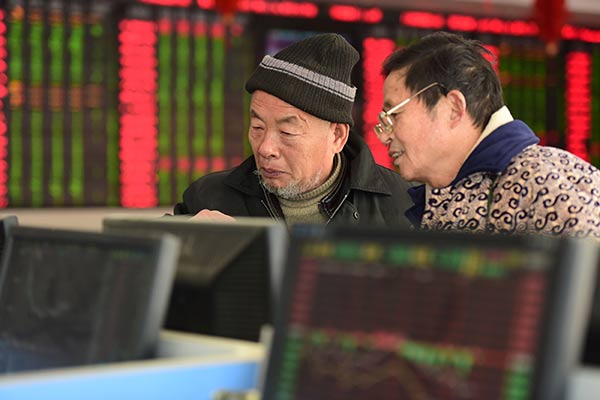Equities subdued on mainland bourses


Equities on the Chinese mainland tracked the global sell-off on Tuesday and edged down on concerns over escalating trade friction between the United States and other nations.
The benchmark Shanghai Composite Index fell by 0.52 percent to 2,844.51 points, with real estate and airline shares leading the decline amid a falling yuan. The Shenzhen Component Index closed 0.16 percent higher at 9,339.37 points. The ChiNext Index, which tracks China's Nasdaq-style board of growth enterprises, gained 1.71 percent to close at 1,564.92 points.
"There are many uncertainties in the trade war initiated by the US, so investors have to cash out to prevent risks," said Li Shuguang, a finance professor at the China University of Political Science and Law. "A shares tracked the global sell-off on Monday."
The Dow Jones industrial average fell for the ninth time in 10 days to 24,252.80, and broader gauges also slumped. The S&P 500 index shed 1.37 percent, to 2,717.07, its worst loss since April 6. The Nasdaq composite fell 2.1 percent and the Russell 2000 index of smaller-company stocks slid 1.7 percent. Germany's DAX on Monday fell 2.5 percent and London's FTSE 100 gave up 2.2 percent. France's CAC 40 shed 1.9 percent.
Conflicting signals from the Trump administration over proposed restrictions on foreign investment in US technology companies, along with news about recently imposed import tariffs, triggered a slide in global stock markets on Monday.
Li said investors also had concerns about the collateral risks in A shares, which could be another reason for the weak market condition.
Typically, company founders or executives pledge some shares they own as collateral to banks in order to raise finance. In case of a stock price downtrend, banks may invoke an agreement clause to either first warn the company concerned or liquidate the collateral in the open market, to cut losses.
Pan Guangwei, executive vice-president of the China Banking Association, said on Tuesday that financial institutions should manage risks of share collateral businesses.
Gao Ting, head of China strategy at UBS Securities, said A-share investors are overly pessimistic. Although the monetary authority has already been fine-tuning policies and structural reform is also on the way, these developments have been overlooked by domestic investors.
"We believe the market sentiment could recover if policy marginally relaxes either in terms of infrastructure or fiscal spending," said Gao.




































